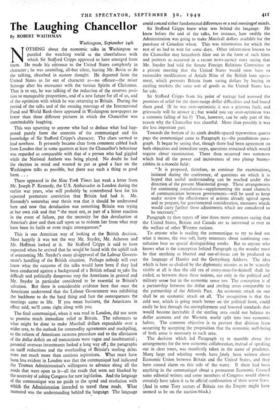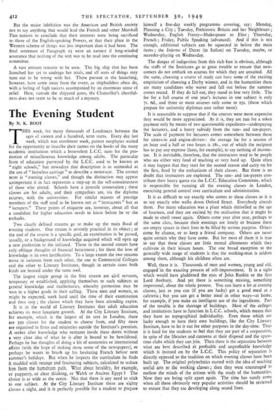The Laughing Chancellor
By ROBERT WAITHMAN Washington, September 24th NOTHING about the economic talks in Washington so puzzled the watching world as the cheerfulness with which Sir Stafford Cripps appeared to have emerged from them. He made his entrance to the United States completely in character ; he was unsmiling, all-but silent, leaving Mr. Bevin to do the talking, absorbed in austere thought. He departed from the United States as far out of character as—no offence—the miser Scrooge after his encounter with the various Spirits of Christmas. That is to say, he was talking of the reduction of the reserves posi- tion to manageable proportions, and of a new future for all of us, and of the optimism with which he was returning to Britain. During the period of the talks and of the ensuing meetings of the International Fund and World Bank .there appeared in Washington newspapers no fewer than three different pictures in which the Chancellor was unmistakably laughing.
This was upsetting to anyone who had to deduce what had hap- pened purely from the contents of the communiqué and his knowledge of Sir Stafford Cripps's character. The clues seemed to lead nowhere. It presently became clear from comment cabled back from London that in some quarters at least the Chancellor's behaviour was regarded as comparable with that of a person who had giggled while the National Anthem was being played. No doubt he had the election in mind and wanted to put as good a face on the Washington talks as possible, but there was such a thing as good form. ...
There appeared in the New York Times last week a letter from Mr. Joseph P. Kennedy, the U.S. Ambassador in London during the earlier war years, who will probably be remembered best for his reported premature conviction that Britain had had it. Mr. Kennedy's somewhat sour thesis was that it should be understood here and now that devaluation was something Britain was trying at her own risk and that " she must not, as part of a bitter reaction in the event of failure, put the necessity for this devaluation at America's door and then call upon us to redeem her from what may have been its futile or even tragic consequences."
This is one American way of looking at the British decision. Most happily it was not the way Mr. Snyder, Mr. Acheson and Mr. Hoffman looked at it. Sir Stafford Cripps is said to have expected when he arrived that he would be faced with the uphill task of overcoming Mr. Snyder's stony disapproval of the Labour Govern- ment's handling of the British situation. Perhaps nobody will ever know what the outcome of the talks would have been if they had been conducted against_a background of a British refusal to take the difficult and politically dangerous step the Americans in general and Mr. Snyder in particular considered to be essential to Britain's salvation. But there is considerable evidence here that once the Americans understood that the Labour Government was exhibiting the backbone to do the hard thing and face the consequences the meetings came to life. If you mean business, the Americans in effect said, we'll come right along with you.
The final communiqué, when it was read in London, did not seem to promise much immediate relief to Britain. The references to what might be done to make Marshall dollars expendable over a wider area, to the outlook for commodity agreements and stockpiling, to the reform of Americans customs procedure and to the alleviation of the dollar deficit on oil transactions were vague and insubstantial ; potential overseas investments looked a long way off ; the paragraphs on tariff reductions and the overhauling of Britain's sterling debts were not much more than cautious aspirations. What must have been less evident in London was that the communiqué had indicated the Truman Administration's willingness to advance along all the roads that were open to it—all the roads that were not blocked by the necessity of asking Congress for new legislation. And the language of the communiqué was no guide to the speed and resolution with which the Administration intended to travel these roads. What
mattered was the understanding behind the language. The language ... could conceal either fundamental differences or a real meetingof minds.
Sir Stafford Cripps knew what was behind the language. He knew before the end of the talks, for instance, how swiftly the Administration was going to make Marshall dollars available for the purchase of Canadian wheat. This was information for which the rest of us had to wait for some days. Other inform nion known to the Chancellor may henceforth filter out in the form of such hints and pointers as occurred in a recent news-agency story saying that Mr. Snyder had told the Senate Foreign Relations Committee at a private meeting that the United States would soon have to reconsider modification of Article Nine of the British loan agree- ment, which prevents Britain from saving dollars by buying in sterling markets the same sort of goods as the United States has for sale.
Sir Stafford Cripps from his point of vantage had assessed the promises of relief for the short-range dollar difficulties and had found them good. (If he was over-optimistic it was a grievous fault, and grievously will he answer it ; but would you say over-optimism was a common failing of his 2) That, however, can be only part of the reason why the Chancellor was cheerful. More than possibly it was the less important part.
Towards the bottom of its ninth double-spaced typewritten quarto page the communiqué came to Paragraph 15—the penultimate para- graph. It began by saying that, though there had been agreement on both objectives and immediate steps, questions remained which would require closer examination. There then occurred two sentences which had all the power and incisiveness of two plump bunny- rabbits in a moonlit field: " It is proposed, therefore, to continue the examinations,
initiated during the conference, of questions on which it is hoped that useful understanding can be reached under the direction of the present Ministerial group. These arrangements for continuing consultation—supplementing the usual channels of communication between governments—will be used to keep under review the effectiveness of actions already agreed upon and to prepare, for governmental consideration, measures which would carry further those adjustments which are considered to be necessary."
Paragraph 15 then tapers off into three more sentences saying that the United States, Britain and Canada are as interested as ever in the welfare of other Western nations.
To anyone who is reading the communique to try to find out what it means, the two soft, furry sentences about continuing con- sultation bear no special distinguishing marks. But to anyone who knows what is the conception behind Paragraph 15 the wonder must be that anything as blurred and out-of-focus can be produced in the language of Hamlet and the Gettysburg Address. The idea which is here so cloaked by the diplomatic niceties as to be scarcely visible at all is that the old era of every-man-for-himself shall be ended, as between these three nations, not only in the political and military sense but in the economic sense too. The conception is of a partnership between the dollar and sterling areas comparable to the partnership of the Atlantic Pact. An economic attack on one shall be an economic attack on all. The recognition is that the cold war, which is going much better on the political front, could easily be lost through the unemployment and lowered standards that would become inevitable if the sterling area could not balance its dollar accounts and the Western world split into two economic halves. The common objective is to prevent that division front occurring by accepting the proposition that the economic well-being of both areas is necessary to each area.
The decision which led Paragraph 15 to mumble about the arrangements for the new economic collaboration, instead of speaking out in clear tones, was manifestly taken in the name of prudence. Many large and whirling words have lately been written about Economic Union between Britain and tfic United States, and they have caused alarm on this side of the water. If there had been anything in the communiqué about a permanent Economic Council some editorial writers and some members of Congress would almost certainly have taken it to be official confirmation of their worst fears. (And in some Tory sectors of Britain too the Empire might have seemed to be on.the auction-block.)
But the major inhibition was the American and British anxiety not to say anything that would lead the French and other Marshall Plan nations to conclude that their interests were being sacrificed to those of the English-speaking Powers, or that their place in the Western scheme of things was less important than it had been. The final sentences of Paragraph 15 were an earnest if long-winded assurance that nothing of the sort was to be read into the continuing committee.
A vast amount remains to be seen. The big ship that has been launched has yet to undergo her trials, and all sorts of things may turn out to be wrong with her. Those present at the launching, however, have come away from the event, as shipbuilders often do, with a feeling of high success accompanied by an enormous sense of relief. Here, outside the shipyard gates, the Chancellor's cheerful- ness does not seem to be so much of a mystery.















































 Previous page
Previous page